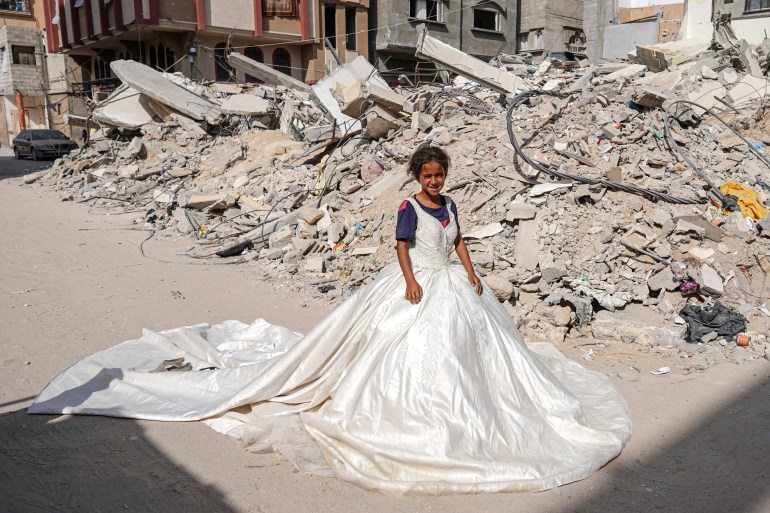‘We’re dead alive’: A year of living and reporting the war on Gaza

In the first months of this war, life seemed almost paralysed. At the time, we were not used to it.
We could barely get by, with so little food, no internet, electricity, chargers or fuel. We were cut off from the world as the attacks persisted all over us.
After about two months of the war, I decided to do something normal, ordinary, necessary. I took my eight-year-old daughter for a haircut.
At her home, Najla the hairdresser warmly welcomed us. She gave us a few moments to feel as though we had just stepped out of this war, even though the sounds were audible everywhere.
Do you encounter customers when the war breaks out? I asked her.
“Of course”, she laughed, explaining that she’d had more work during the war than at any other time.
I was shocked by her response. What kinds of services could women have requested.
“Everything”, she answered. “From facials and eyebrow cleaning, haircuts, body hair removal, hair dye, highlights, some of them makeup, and so on”.
Najla looked at me in shock as she cut my daughter’s hair.
“What’s wrong with you? Does a woman’s personality change during a war?” she asked.
For a moment, I felt joy at the thought of these elegant, well-groomed women of Gaza who cared about their appearance, just as any other woman anywhere else might.
Then I began to feel bitterness and sadness over how the war had treated them badly, how it had tried to erase their lustre, and how much responsibility and burdens they imposed.
Throughout this war, I have continued to visit Najla. She has emailed me several different client stories, some humorous and others painful.
When I inquire about what these women wear and how their weddings are prepared, she replies, “Every day we have one or more brides who come dressed up for their wedding day.”
Most war-time brides are satisfied with bridal makeup and a simple hairstyle, she explains. Some people insist on buying a white dress after searching for one desperately, while others settle for a plain outfit with embroidery. She claims that the wedding is quick and then the groom visits his tent or home with the bride and her family.
She tells me about a bride whose entire family was killed in a bombing while her cousin’s entire family was also killed.
She says that because their families were martyred, the cousin decided to wed his cousin to comfort each other.
I think about how marriages elsewhere begin with joy and celebration, while in Gaza they start with loss and loneliness.
That bride had refused to wear a white dress, despite Najla’s attempts to persuade her.
“The stories are many”, the hairdresser explains, as she sweeps the floor. “I saw many women and heard many sad stories”.
I take the longest route back when I come back from a trip to Najla. The people’s lives that don’t often make it into news reports need to be absorbed, as she has shared. I consider how to tell these tales, but it’s difficult when there are so many to tell about the destruction.
Should I write the tale of the young woman who lost her entire family and walking ability or the young girls who were bombed and who lost their legs in the process?
Source: Aljazeera
Leave a Reply